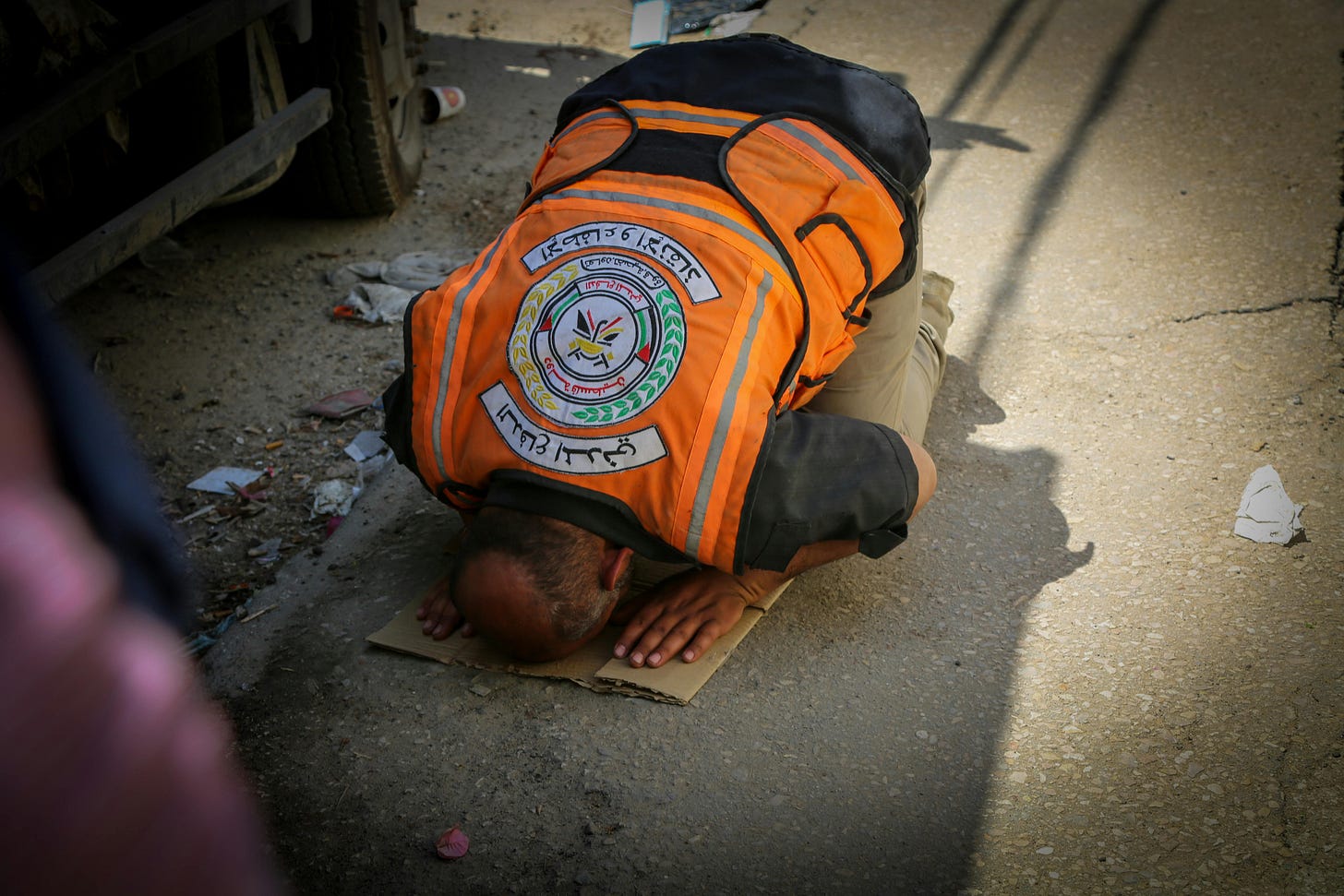Ramadan in the face of war and starvation
How Israel is using starvation as a weapon of war, according to multiple human rights agencies
On the first day of Ramadan, thousands of Palestinians prayed next to rigid tents, camps and ruins of a mosque hit by an Israeli airstrike. They sat in rows in front of a religious leader with his hands folded as his call to prayer hummed across the war-torn land. Those who weren’t praying were scouring for whatever food they could find, while others were separated from the crowd—awaiting a miracle or death.
“I wish the planes would bomb me and I die," said 63-year-old Zaki Hussein Abu Mansur, a once proud owner of a house in Khan Yunis—where Israeli forces are engaged in a ground operation— told AFP. "It is better to die than live this life.”
As Muslims worldwide celebrate Ramadan, a holy month where many Muslims fast daily from dawn to dusk and mark the occasion with feasts, prayers and loved ones, Palestinians are dull and hopeless. The joy that Ramadan normally brings dwindles amidst bombs, bullets, and barricades from the Israeli military.
Since Israel's military campaign began on Oct. 7, over 31,000 Palestinians have been killed, which experts say is probably an “undercount.” The Israeli government plans to expand this war into Rafah, where 1.4 million displaced Palestinians are seeking refuge, despite warnings from allies, including the U.S. The UN said an invasion of Rafah would create a humanitarian catastrophe in Gaza.
This destruction is exacerbated during Ramadan as Israel—according to multiple human rights agencies—uses starvation as a weapon of war. These tactics include destroying agricultural lands, cutting off the use of electricity, and, most famously, limiting the number of aid trucks that can enter the region, forcing nations with intentions of assistance to airdrop their aid or bring it in through the sea.
"Starvation is being used as a war arm and when we condemned this happening in Ukraine, we have to use the same words for what is happening in Gaza,” Josep Borrell, the European Union’s High Representative of the European Union for Foreign Affairs and Security Policy, told BBC News. "[The humanitarian crisis is] manmade and when we look for alternative ways of providing support by sea, by air, we have to remind [ourselves] that we have to do it because the natural way of providing support through roads is being... artificially closed.”
The consequences of these closures and the war are deadly.
Famine is occurring in Northern Gaza with more than 1.1 million people or half the population are struggling with catastrophic hunger and starvation, according to a report by the World Food Program (WFP). This famine is affecting children and toddlers the most, as one-third of children under the age of 2 are acutely malnourished. This number was less than one percent before Oct. 7.
Some Palestinian children, according to the UN, don’t “even have the energy to cry.”
The WFP report said that this famine and destruction can be significantly reduced if aid organizations are given full access to provide food, water, medicines, and other supplies to the entire civilian population. It also said that to address basic food needs, at least 300 aid trucks need to enter Gaza every day. But the most recent delivery of aid trucks, which have been restricted by Israeli forces since the start of the war, included only 18 trucks.
The report concluded by saying this famine can only be prevented with a humanitarian ceasefire.
“People in Gaza are starving to death right now. The speed at which this man-made hunger and malnutrition crisis has ripped through Gaza is terrifying,” said WFP Executive Director Cindy McCain. “There is a very small window left to prevent an outright famine and to do that we need immediate and full access to the north. If we wait until famine has been declared, it’s too late. Thousands more will be dead.”
Written by Rahim Jessani


